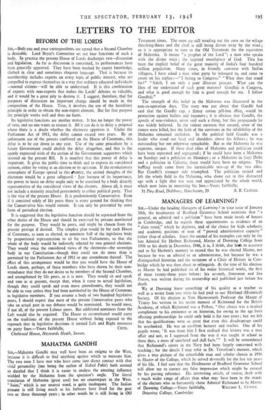MAHATMA GANDHI
Sta,—Mahatma Gandhi may well have been an enigma to the West, because it is difficult to find anything against which to measure him. The two men I have met who have come into direct contact with that vivid personality (one being the author of Naked Fakir) both seemed so dazzled that I think it is easier to analyse the amazing influence wielded by the Mahatma from the spectator's angle. The literal translation of Mahatma (great soul) has no counterpart in the West. "Saint," which is our nearest word, is quite inadequate. The Indian peasant is still living much as his forbears have lived for the past two or three thousand years ; in other words he is still living in Old Testament times. The oxen are still treading out the corn on the village threshing-floors and the chaff is still being driven away by the wind ; so it is appropriate to turn to the Old Testament for the equivalent of Mahatma. It means "a prophet of the Lord "; a man who speaks with the divine voice ; the inspired mouthpiece of God. This has been the implicit belief of the great majority of India's four hundred million population. Many times, in friendly converse with Indian villagers, I have asked a man what party he belonged to, and came to count on his replies :—" I belong to Congress." "What does that stand for?" "Sahib, I am only a poor illiterate peasant. What can the likes of me understand of such great matters? Gandhiji is Congress, and what is good enough for him is good enough for me. I follow Gandhiji."
The strength of this belief in the Mahatma was illustrated in the non-co-operation days. The story was put about that Gandhi had said that the Gandhi cap, a flimsy cotton pill-box affair, would be protection against bullets and bayonets ; it is obvious that Gandhi, the apostle of non-violence, never said such a thing, but this propaganda lie was widely believed. In the violent excesses that ensued, some of the rioters were killed, but the faith of the survivors in the infallibility of the Mahatma remained unshaken. In the political field Gandhi was a leader who stood out head and shoulders above his fellows ; he was outstanding but not otherwise remarkable. But as the Mahatma he was supreme, unique. If these dual roles of Mahatma and politician could have been separated and segregated ; if he could have been a Mahatma on Sundays and a politician on Mondays ; or a Mahatma in (say) Delhi and a politician in Calcutta, there would have been no enigma. The baffling result came from the inextricable mix-up of the two roles. But Gandhi's stronger side triumphed. The politician retired and left the whole field to the Mahatma, who shone out in this distracted age with a light that was seen and appreciated by the whole world, which now joins in mourning his loss.—Yours faithfully,
31 Pine Road, Didsbury, Manchester, 20 A. R. CLOUGH.


































 Previous page
Previous page